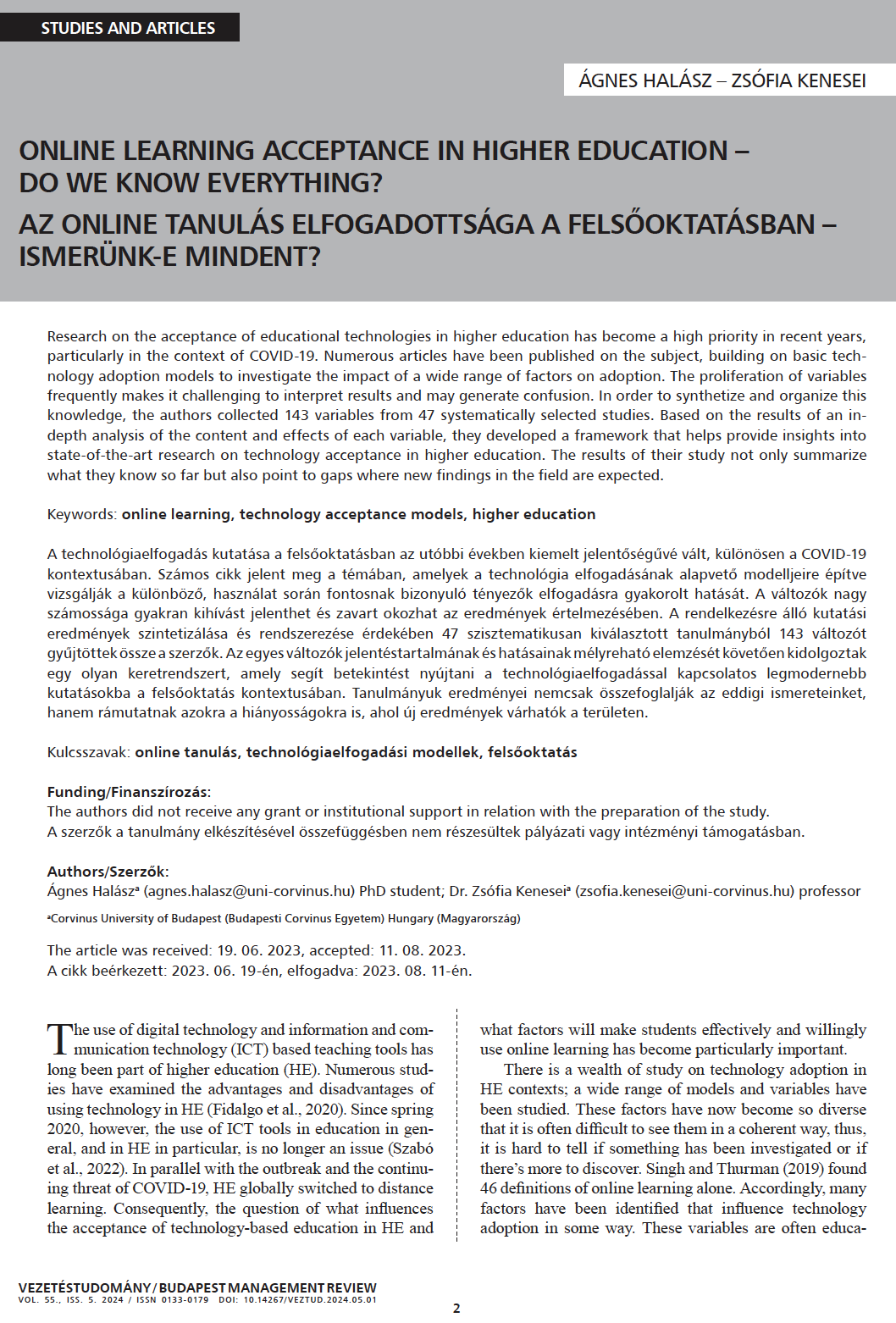Online learning acceptance in higher education
Do we know everything?
DOI:
https://doi.org/10.14267/VEZTUD.2024.05.01Keywords:
online learning, technology acceptance models, higher educationAbstract
Research on the acceptance of educational technologies in higher education has become a high priority in recent years, particularly in the context of COVID-19. Numerous articles have been published on the subject, building on basic technology adoption models to investigate the impact of a wide range of factors on adoption. The proliferation of variables frequently makes it challenging to interpret results and may generate confusion. In order to synthetize and organize this knowledge, the authors collected 143 variables from 47 systematically selected studies. Based on the results of an in-depth analysis of the content and effects of each variable, they developed a framework that helps provide insights into state-of-the-art research on technology acceptance in higher education. The results of their study not only summarize what they know so far but also point to gaps where new findings in the field are expected.
Downloads
References
Abdullah, F., & Ward, R. (2016). Developing a general extended Technology Acceptance Model for e-learning (GETAMEL) by analysing commonly used external factors. Computers in Human Behavior, 56, 238-256. https://doi.org/10.1016/j.chb.2015.11.036
Batra R. & Ahtola O.T. (1990). Measuring the hedonic and utilitarian sources of consumer attitudes. Marketing Letters, 2(2), 159–70. https://doi.org/10.1007/BF00436035
Granić, A. & Marangunić, N. (2019). Technology acceptance model in educational context: A systematic literature review. British Journal of Educational Technology, 50(5), 2572–2593. https://doi.org/10.1111/bjet.12864
Kaushik, M.K. & Verma, D. (2020). Determinants of digital learning acceptance behavior: A systematic review of applied theories and implications for higher education. Journal of Applied Research in Higher Education, 12(4), 659-672. https://doi.org/10.1108/JARHE-06-2018-0105
Keszey, T., & Zsukk, J. (2017). Az új technológiák fogyasztói elfogadása. A magyar és nemzetközi szakirodalom áttekintése és kritikai értékelése. Vezetéstudomány – Budapest Management Review, 48(10), 38-47. https://doi.org/10.14267/VEZTUD.2017.10.05
Keszey, T. (2020). Behavioural intention to use autonomous vehicles: Systematic review and empirical extension. Transportation Research Part C: Emerging Technologies, 119, 102732. https://doi.org/10.1016/j.trc.2020.102732
Martin, F. & Bolliger, D.U. (2022). Developing an online learner satisfaction framework in higher education through a systematic review of research. International Journal of Educational Technology in Higher Education 19 (50), 1-21. https://doi.org/10.1186/s41239-022-00355-5
Martin, F., Sun, T., & Westine, C.D. (2020). A systematic review of research on online teaching and learning from 2009 to 2018. Computers & Education, 159, 104009. https://doi.org/10.1016/j.compedu.2020.104009
Moher, D., Liberati, A., Tetzlaff, J., Altman, D.G., & PRISMA Group*. (2009). Preferred reporting items for systematic reviews and meta-analyses: the PRISMA statement. Annals of Internal Medicine, 151(4), 264-269. https://doi.org/10.7326/0003-4819-151-4-200908180-00135
Ryan, R.M. & Deci, E.L. (2009). Promoting self-determined school engagement: Motivation, learning, and well-being. In K.R. Wenzel & A. Wigfield (Eds), Handbook of Motivation at School (pp. 171–195). Routledge/Taylor & Francis Group.
Paul, J. & Criado, A.R. (2020). The art of writing literature review: What do we know and what do we need to know? International Business Review, 29(4), 101717. https://doi.org/10.1016/j.ibusrev.2020.101717
Siegrist, M. (2021). Trust and risk perception: A critical review of the literature. Risk Analysis, 41(3), 480-490. https://doi.org/10.1111/risa.13325
Singh, V. & Thurman, A. (2019). How many ways can we define online learning? A systematic literature review of definitions of online learning (1988-2018). American Journal of Distance Education, 33(4), 289–306. https://doi.org/10.1080/08923647.2019.1663082
Szabó, K., Juhász, T., & Kenderfi, M. (2022). Felsőoktatás a COVID-19 árnyékában: Hazai tapasztalatok oktatói oldalról. Vezetéstudomány – Budapest Management Review, 53(6), 2-12. https://doi.org/10.14267/VEZTUD.2022.06.01

Downloads
Published
How to Cite
Issue
Section
License
Copyright (c) 2024 Vezetéstudomány / Budapest Management Review

This work is licensed under a Creative Commons Attribution 4.0 International License.
Authors assign copyright to Vezetéstudomány / Budapest Management Review. Authors are responsible for permission to reproduce copyright material from other sources.

